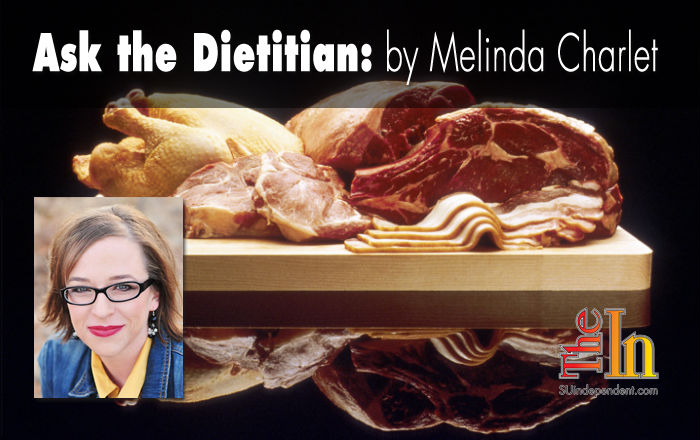
Written by Melinda Charlet
Dear Dietitian,
I have a friend that is a vegetarian and I have heard her talking about sustainable diets. I have thought about becoming vegetarian and I’m wondering how sustainability relates to this. What does this term mean and how does it apply to me?
Pondering Paula
Dear Paula,
Sustainability has been kind of a hot topic lately. A sustainable diet is a diet that takes into account the impact that food consumption has on the environment and other planetary resources such as society and the economy. People choose to follow a vegetarian diet for economic, environmental, or health reasons; or a combination of these. Sustainability takes all of these things into consideration. The United Nations Food and Agricultural Organization (FAO) defines a sustainable diet as “those diets with low environmental impacts which contribute to food and nutrition security and to healthy life for present and future generations. Sustainable diets are protective and respectful of biodiversity and ecosystems, culturally acceptable, accessible, economically fair and affordable; nutritionally adequate, safe and healthy; while optimizing natural and human resources.”
There are several different ways of eating that are considered sustainable, but they are all low carbon or plant-based diets. Animal protein takes significantly more water, fossil fuel, and energy to produce than plants. For example, it takes approximately 2,400 gallons of water to produce 1 pound of meat compared to 25 gallons for 1 pound of wheat. To put that into perspective, you would save more water by not eating a pound of meat than you would by not showering for six months!
The amount of fossil fuel that it takes to make one calorie from animal protein is 11 times higher than for making one calorie of plant protein. To get that hamburger to your plate, you have to start by growing massive amounts of corn or other grain, transport the grain to the feed manufacturer, operate the feed mill, transport the feed to the factory farm, operate the farm, truck the animal to the slaughter house, operate the slaughter house, transport the meat to the processing plant and then to the grocery store, and finally keep it refrigerated until it is bought and then cooked. That is a lot of steps that all require fuel and energy. The amount of carbon dioxide produced by this process is also significantly more than producing and processing plants. Degrading soil and polluting water are also concerns.
Land use is another important sustainability concern. Raising animals for food. which includes the land used for growing feed crops and also for grazing, uses a staggering 30 percent of the Earth’s land area. It is also very inefficient because compared to the large quantities of grain they consume, animals produce a relatively small amount of meat, eggs or dairy products in return.
Animal-based diets are also not considered sustainable for our health. The typical American diet lacks nutrients, contains too much processed food and not enough fruits and vegetables. Studies have shown that if followed for an extended period of time, this kind of diet leads to chronic illnesses and is not sustainable for health and wellness. A sustainable diet is one that promotes health, an ideal weight, and prevents chronic diseases throughout your life.
Due to increasing global demands for food caused by a growing population and increasing animal protein consumption, our current production methods and eating habits are not sustainable and are contributing to environmental problems that need to be addressed sooner than later. We can do our part towards promoting sustainability by following several easy steps:
-Eat more plants
-Waste less food
-Eat less meat, dairy products and processed food
-Grow your own food and buy locally
Hopefully this explanation has helped you understand what your friend was talking about when she referred to a sustainable diet and how it applies to you. We all have a responsibility to this earth that we live on and to each other, to help preserve its resources for ours and future generations.
Healthy wishes,
Melinda the Dietitian
Feel free to submit your nutrition related questions and I will address them in future editions of Ask the Dietitian.
Melinda Charlet is a Registered and Licensed Dietitian that lives in St. George, Utah. She has a bachelor’s degree in Medical Dietetics and works throughout Southern Utah and Nevada helping patients and clients achieve proper nutrition for their individual needs. She also runs her own weight-loss clinic and likes to create healthier versions of recipes in her free time. She assists people with a variety of conditions including diabetes and kidney disease, and counsels people that would like to lose some weight, need help dealing with cholesterol issues or simply want to live a healthier lifestyle. Send her your questions at[email protected].




